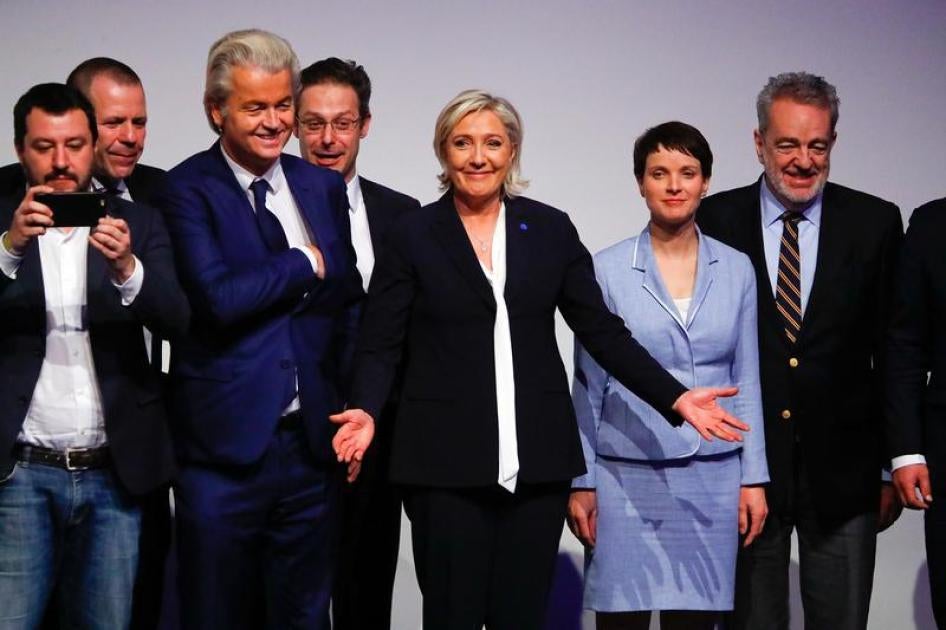With only three months gone, populism looks like a shoo-in for word of year. Headlines warn that populism is a threat to Europe, perhaps even an existential one. Populist radical right parties have the wind in their sails, the argument goes, boosted by Brexit and Donald Trump’s victory in the US presidential elections.
But how big a threat are radical populists really?
In the first big test in 2017, the Dutch general elections, the xenophobic Party of Freedoms (PVV), led by Geert Wilders, secured 20 seats and 13 percent of the vote. That’s a lot but don’t forget that in 2010 (when populism was not on most people’s radar), the party won 24 seats and almost 16 percent of the vote. And even before the vote, the other parties had ruled out going into coalition with the PVV.
The next big test for Europe comes in April with the first round of France’s presidential election. Polls suggest that Marine Le Pen will get through to the second round in May, possibly even coming out on top in the first round. But the same polls suggest she will be defeated by a significant margin in the second round, whoever her opponent is. And that is despite a much more sophisticated campaign—disavowing racism and anti-Semitism—than her father when he reached the second round of the presidential elections in 2002.
And let’s not forget Austria, where the race for the presidency was twice won in 2016 by a Green party candidate, defeating the candidate from the xenophobic Freedom Party.
True, the long-term trends point to a growth in support for radical right populist parties in Europe. That is especially true in the European Parliament, where in the 2014 elections populists won most seats in France, the UK, and Denmark and a quarter of the seats in the Parliament overall.
And in Hungary and Poland we can see the risks of a populist approach to government, in which the “will of the people” reflected in majority support is more important than democratic institutions themselves. Those governments pursue abusive and stigmatizing policies toward migrants, the homeless and women – often in the sphere of reproductive rights -- and show disdain for checks and balances, the rule of law and supranational authority.
Yet the biggest risk to Europe today is arguably not the prospect of radical right populists in power, which has so far been limited, but their outsize influence on mainstream policymakers. Instead of courageously confronting the flawed arguments of insurgent populist parties and defending policies based on rights, mainstream parties have aped their agenda for fear of losing votes.
That fear is arguably the biggest policy consideration for many European governments today. At recent meetings in Brussels trying to convince the EU to do a better job of protecting refugees and asylum seekers, I was repeatedly told that the risk of ceding ground to populists stood in the way of rights-respecting policy.
Council President Donald Tusk has effectively argued that the EU needs to set aside core values to combat migration and terrorism -- so as to preserve the EU and the values it embodies in the long term.
This attitude and position from mainstream political leaders represents as much of a challenge and threat to human rights values as do the populists themselves. It legitimizes and normalizes the hateful agenda of the xenophobic, anti-Islam, anti-refugee populists, with none of the costs that go along with being in power and held to account. It means that even if the populists lose at the ballot box they still win.
The Dutch elections provide a clear example of this. In January, Prime Minister Mark Rutte, leader of the ruling People's Party for Freedom and Democracy, took out a full page ad in Dutch newspapers, telling the country’s inhabitants that those who “refuse to adapt, and criticize our values” should “behave normally, or leave.”
While there is a legitimate debate to be had about tolerance and integration, Rutte’s dog-whistle message was clearly designed to appeal to those who believe that the best solution is to deport people even if they are citizens who have lived in the country for their entire lives. It was not a defence of values but a betrayal of them.
France’s presidential contenders face a similar choice. They can adopt the approach of Nicolas Sarkozy in the second round of the 2012 presidential race, taking up a strong anti-Islam and anti-immigration stance in the hope of attracting National Front voters (and ultimately losing, even while normalizing those ideas). Or they can stand up for foundational European values and offer real leadership, in tackling society’s challenges in ways that preserve basic human rights.
There are risks in Italy too, with snap elections a possibility this year. The electoral challenge from the populist Five Star Movement, as well as the xenophobic Northern League, helps explain why the ruling Democratic Party is taking a much tougher line on migration.
But it doesn’t have to be this way. The winning candidate in the Austrian presidential elections refused to follow the government’s pale embrace of his opponent’s xenophobic anti-refugee agenda. Instead he offered a positive agenda and won comfortably.
Populism matters. But how Europe’s mainstream parties respond matters even more.
- - -
This commentary has been published in EU Observer (English); de Volkskrant (Dutch); Nouvel Obs (French); Enorm (German); Gazeta Wybrorcza (Polish).









